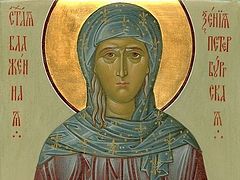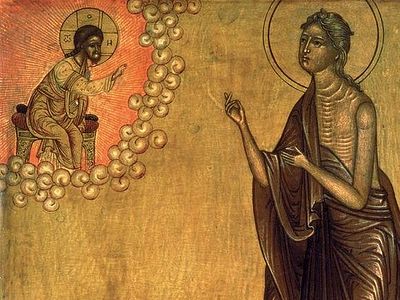On January 24/February 6, the Russian Orthodox Church celebrates the memory of St. Xenia of St. Petersburg. The story of this woman, who for the sake of serving God and man renounced everything, still amazes and causes wonder. We asked the rector of the Church of the Smolensk Icon of the Mother of God and the chapel of St. Xenia in St. Petersburg, Archpriest Viktor Moskovsky, about the personality, the canonization history, and the spiritual labors of St. Xenia of St. Petersburg, and also about what is a fool-for-Christ and whether they exist in our times.
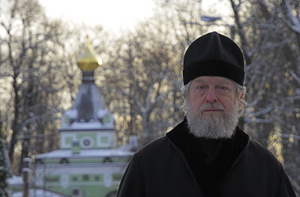 Archpriest Viktor Moskovsky
Archpriest Viktor Moskovsky The Church canonized St. Xenia, above all, for her love for the people of God, for her patience, and for her prayer. She performed her prayerful labor in the cold and in the sweltering heat—she prayed for the whole city of St. Petersburg, and for the whole country.
She was canonized for the good deeds she did for literally everyone, especially the disgruntled and the suffering. If St. Xenia caressed a child, it was a joy for the parents; if she rode with someone in a carriage, it was considered a good sign. Therefore, love, mercy, spiritual purity, service to God and man with full dedication—these all served as a basis for the canonization of Xenia of St. Petersburg. Here we can note the fact that the people’s veneration of St. Xenia began long before her canonization, and this is also a great witness.
2. Generally, how should we relate to the rank of Fools-for-Christ? After all, we know that it was forbidden in Russia at one time.
“Foolishness” is a special and rare gift, it is a spiritual feat given to man from above. This gift is not given to everyone. And here we should remember that when they began the canonization of St. Xenia, several people tried to emulate her, even tried to copy her lifestyle, going barefoot. However, a month or two later, these people either wound up in a hospital or gave it up, because it wasn’t given to them. I repeat, “foolishness” is a gift from above, a gift from God.
As for relations with the authorities, here we must understand that earlier, possessing this gift, people would go to the tsar, the ruler, or a dignitary, and would calmly rebuke him for his sins, telling him the truth. In order to behave this way, you need special power from God. A normal person, of course, could not do this. And most importantly, the rulers would heed these accusations, the words of the fools. Afterwards they would somehow change their lives, change their attitude towards the people, and correct themselves.
Such people might outwardly resemble the deviant, but inwardly they were clean. They could be completely inconspicuous people, doing great works, because in their words before the authorities they reflected the troubles, difficulties, and problems of the people.

Bringing notes to St. Xenia is already an established tradition that developed in a special way. The fact is that for a long time, the chapel was fenced-in and closed and the people couldn’t pray, they couldn’t address their words to St. Xenia; they couldn’t have molebens, or venerate her tomb. Therefore, people began bringing notes and leaving them at the chapel, stuck in different places in the fence and in the cracks.
Today there isn’t really such a necessity. You can just calmly come to the chapel, order a moleben and write a normal list which the priest will read. However, the tradition of bringing notes continues to exist. We’re not going to break it, because that would probably not be quite correct. We made a special box where people can leave those notes.
There’s no need, really, to break this tradition. We should treat this phenomenon carefully—after all, many people pour their souls into these notes, speaking of their internal problems, asking St. Xenia for her intercessions. And at the same time, we must never treat it as some kind of primitive magic that says you just make a wish and it will come true. These kinds of notes are a type of Christian prayer, of Christian communication with a saint, not a vending machine for fulfilling wishes.
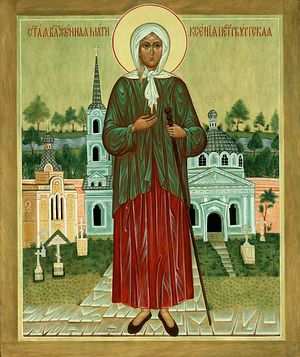
This is not a simple question. I will note that sometimes people come to us at the church, trying to behave like a fool—they try to say something special, they try to behave peculiarly, but it’s clear that this gift was not given them by God. Therefore, I haven’t personally met any fools; perhaps I’m just not given to see them. And overall today, fools, or at least something similar, like St. Xenia, for example, are not seen. If there were such people now, they would probably be famous, and people would know about them.
However, I cannot say that they don’t exist at all. It’s impossible to deny that there could be a fool somewhere. Maybe these people aren’t so noticeable now; maybe they live far from us, on the periphery. Maybe someone is bearing such asceticism somewhere and only the Lord God knows about him. But I repeat, the Lord has as yet not granted me to see and know such people.
5. In your view, what is the value of the ministry of St. Xenia of St. Petersburg for modern man? What important things can we take away from her life?
The fact that St. Xenia was so far from passionate human needs can serve as an example for modern man. She gave away everything she had to those around her. St. Xenia gave her home as free lodging for those in need, she completely gave away all of her possessions, did good works, and helped people as she was able. And yet, inwardly, she was a very modest woman. Today, St. Xenia gives us an example of decency, spiritual purity, non-possessiveness, and prayer. She gives us an image of how a man who loves God should live. Of course, today we have a different society and different codes of conduct, so we can’t fully repeat her asceticism—to go around the streets in tattered clothes, barefoot. But we can spiritually repeat her asceticism, reflecting those virtues, that love which St. Xenia possessed.


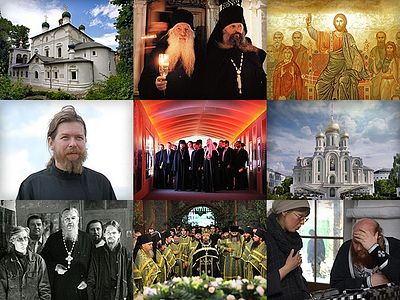

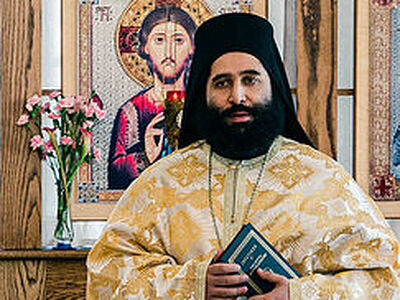
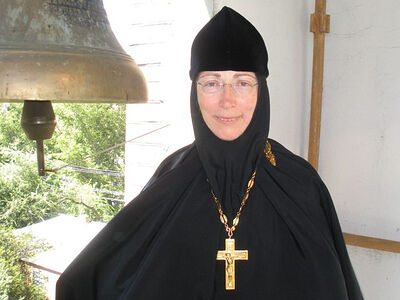




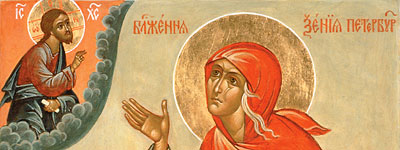 St. Xenia of PetersburgSt. Xenia of Petersburg
St. Xenia of PetersburgSt. Xenia of Petersburg Love: The Power of Christian LeadershipIn Fyodor Dostoyevsky’s “Legend of the Grand Inquisitor” from his book, The Brothers Karamazov, we encounter contrasting and conflicting images of religious power.
Love: The Power of Christian LeadershipIn Fyodor Dostoyevsky’s “Legend of the Grand Inquisitor” from his book, The Brothers Karamazov, we encounter contrasting and conflicting images of religious power. “Lord Have Mercy” As a Way of LifeOften people who come to the Orthodox Church for the first time are quite amazed at the number of times they will hear us pray “Lord have mercy” at every service and especially at the Divine Liturgy. This is no accident but a purposeful habit that the Church, our mother, is trying to form within us.
“Lord Have Mercy” As a Way of LifeOften people who come to the Orthodox Church for the first time are quite amazed at the number of times they will hear us pray “Lord have mercy” at every service and especially at the Divine Liturgy. This is no accident but a purposeful habit that the Church, our mother, is trying to form within us.